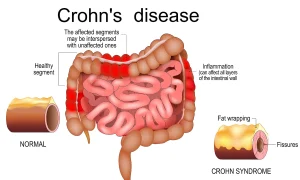Overview
Diagnosis
A healthcare professional will likely diagnose Crohn’s disease only after ruling out other possible causes for symptoms. There is no single test to diagnose Crohn’s disease.
A combination of tests may be used to help confirm a diagnosis of Crohn’s disease, including:
Lab tests
Blood tests can check for signs of infection or anemia, a condition in which there are not enough red blood cells to carry oxygen to the tissues. These tests may also be used to check inflammation levels, liver function, or the presence of inactive infections such as tuberculosis. Blood may also be screened for immunity against infections.
Stool studies can detect blood or infection-causing organisms, including bacteria or parasites, to determine causes of diarrhea and related symptoms. Measuring stool markers of inflammation, such as calprotectin, can also be helpful.
Procedures
Colonoscopy uses a small camera on the end of a flexible tube to examine the entire colon and the end of the ileum. During this procedure, small tissue samples called biopsies may be taken for laboratory analysis. Clusters of inflammatory cells known as granulomas may suggest a diagnosis of Crohn’s disease.
A CT scan provides more detailed images than standard X-rays and allows examination of the entire bowel and surrounding tissues. CT enterography, a special type of CT scan, uses oral and intravenous contrast to produce clearer images of the small intestine and has replaced barium X-rays in many centers.
MRI scans use magnetic fields and radio waves to create detailed images of organs and tissues. MR enterography is particularly useful for evaluating fistulas near the anus or small intestine and may be preferred over CT to avoid radiation exposure, especially in younger people.
Capsule endoscopy involves swallowing a capsule containing a tiny camera. The camera captures images of the small intestine and transmits them to a recorder worn on a belt. The images are later analyzed for signs of Crohn’s disease. Endoscopy with biopsy may still be required to confirm diagnosis. Capsule endoscopy is not recommended if there is a suspected bowel obstruction or narrowing, as the capsule could become stuck.
Treatment
There is currently no cure for Crohn’s disease, and no single treatment works for everyone. Several approved medicines can help reduce inflammation and manage symptoms. The goals of treatment include reducing inflammation, improving long-term outcomes, and preventing complications.
Anti-inflammatory medicines
Anti-inflammatory medicines are often the first step in treating inflammatory bowel disease.
-
Corticosteroids such as prednisone and budesonide can reduce inflammation but do not work for everyone. They are typically used for short periods of three to four months to induce remission and may be combined with immune suppressors.
-
Oral 5-aminosalicylates such as sulfasalazine and mesalamine may be used for mild to moderate Crohn’s disease, especially when it affects the colon.
Immune system suppressors
These medicines reduce inflammation by targeting the immune system, which produces inflammatory substances.
-
Azathioprine and mercaptopurine are the most widely used and require regular blood monitoring to prevent side effects such as liver inflammation or reduced resistance to infection.
-
Methotrexate may be used if other medicines are not effective.
Biologics
Biologic therapies target specific proteins produced by the immune system.
-
TNF inhibitors such as infliximab, adalimumab, and certolizumab pegol block tumor necrosis factor to reduce inflammation.
-
Ustekinumab interferes with interleukin activity involved in inflammation.
-
Vedolizumab is a gut-specific monoclonal antibody that prevents immune cells from binding to intestinal tissue.
-
Risankizumab targets interleukin-23 and is approved for moderate to severe Crohn’s disease.
Biosimilars, which are synthetic versions of biologics, work similarly but may cost less.
Janus kinase inhibitors
JAK inhibitors are small-molecule medicines taken by mouth that block parts of the immune response responsible for intestinal inflammation. Upadacitinib is approved for Crohn’s disease that has not responded to other treatments. These medicines are not recommended during pregnancy.
Antibiotics
Antibiotics may help reduce drainage from fistulas and abscesses and may decrease harmful bacteria in the intestines. Commonly prescribed antibiotics include ciprofloxacin and metronidazole.
Other medicines
Certain medicines can relieve symptoms but should be used under medical supervision.
-
Anti-diarrheals such as psyllium husk or methylcellulose can help mild diarrhea, while loperamide may help severe diarrhea.
-
Pain relievers such as acetaminophen can help mild pain. Ibuprofen, naproxen, and similar pain relievers should be avoided as they may worsen symptoms.
-
Vitamins and supplements may be recommended if nutrient absorption is impaired.
Nutrition therapy
A healthcare professional may recommend a special diet given orally or through a feeding tube, called enteral nutrition. Nutrients can also be delivered intravenously, known as parenteral nutrition. These methods can rest the bowel and reduce inflammation in the short term.
Nutrition therapy may be combined with medications such as immune suppressors and is often used before surgery or when other treatments are ineffective.
A low-residue or low-fiber diet may be recommended to prevent intestinal blockage in people with strictures. This diet reduces stool volume and frequency.
Surgery
If diet, lifestyle changes, and medicines fail to control symptoms, surgery may be recommended. Nearly half of people with Crohn’s disease will require at least one surgery.
During surgery, the damaged section of the digestive tract is removed and the healthy parts are reconnected. Surgery may also close fistulas or drain abscesses.
However, surgery is not a cure, as the disease often returns near the reconnected area. Following surgery, ongoing medication is often advised to reduce the risk of recurrence.
Advertisement

